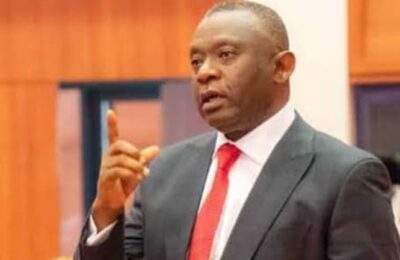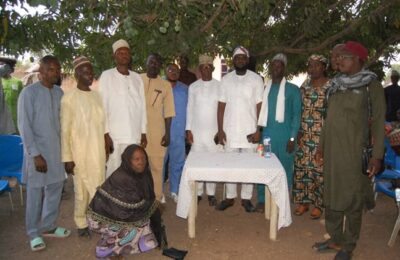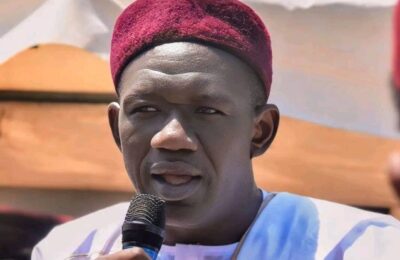In the gathering storm of 2027 politics, one figure stands like a colossus on the horizon of Kogi’s future: Yakubu Murtala Ajaka. His name is whispered in the markets of Idah and Dekina in the East, echoed in the towns of Okene and Adavi in the Central, and invoked in the homes of Kabba, Yagba, and Lokoja in the West. From the banks of the River Niger to the hills of Okunland, Ajaka’s presence is felt, and his name is debated in political circles across Nigeria. And yet, he holds no office. He is not draped in the regalia of power. He has no government machinery at his disposal. Still, he already defines the rhythm of Kogi politics.
Ajaka’s influence is not borrowed from political titles or inherited from dynastic traditions. It is rooted in the soil of service and fertilized by philanthropy. He has emerged as the people’s candidate not because he sought to manipulate structures, but because he has lived among the people, shared in their pain, and consistently answered their call.
The 2023 governorship election revealed the depth of this connection. Contesting under the banner of the Social Democratic Party, Ajaka shocked the entrenched order by turning the election into a two-horse race with the ruling APC.
Despite all the alleged manipulations that tilted the scales, Ajaka placed second. But in truth, he came first where it mattered most, in the hearts of ordinary Kogites across the three senatorial zones. His campaign was not just another electoral exercise; it was the crystallization of a movement.
Yet Ajaka is not defined by campaigns or elections alone. What sets him apart is his character and his philosophy of service. He is, perhaps, one of the few Nigerian politicians whose philanthropy is not mediated by cameras. He does not turn charity into spectacle. Ajaka does not open Facebook or Instagram to advertise his humanitarian work. Instead, he builds roads in remote communities of Kogi East, lights up neighborhoods in Kogi Central, and pays hospital bills in millions for patients in Kogi West. From kidney transplants to emergency surgeries, he has stepped in where the government failed. He pays tuition fees for countless students, rescues orphans and widows across all districts, and even funds religious pilgrimages—sponsoring Muslims for Hajj and Christians for Jerusalem. He has resettled flood victims in riverine communities, replaced transformers in towns and villages, and empowered market women in every corner of the state to expand their businesses.
And yet, he insists that these acts should remain quiet. He tells those who attempt to publicize them to stop, because to him, true service does not need applause. In an age where politicians distribute bags of rice with television crews in tow, Ajaka quietly invests his wealth in people without fanfare. This is why he is different. This is why he resonates.
What many do not realize is that Ajaka’s politics is not about personal ambition—it is about a vision of democracy that is both grassroots and participatory. He embodies the idea that leadership should not be an event, tied only to elections, but a continuous lifestyle of service. If democracy is truly the government of the people, then Ajaka represents democracy in its most unadulterated form.
The Social Democratic Party, under his influence, has ceased to be just another political platform. It has become a reformist movement, a rallying point for those who believe politics should be accountable and transparent. Ajaka has injected credibility into the SDP by embodying its ideals in his personal life. In a political system corrupted by patronage and power-brokering, he has shown that legitimacy can flow directly from the people.
But perhaps his most underrated quality is his role as a unifier. In a state and a country often fractured by religion, ethnicity, and cynicism, Ajaka has deliberately blurred those lines. By sponsoring both Hajj and Christian pilgrimages, he underscores the equal dignity of faiths. By aiding flood victims in Ibaji, widows in Okene, orphans in Kabba, and market women in Ankpa, he demonstrates that his concern is not sectarian but human. He does not govern through identity politics; he governs through empathy.
The resilience he displayed after the 2023 election further cements his stature. Lesser politicians would have retreated into bitterness or obscurity. Ajaka, instead, emerged stronger, more admired, and more rooted in the affection of his people across East, Central, and West. Adversity did not break him; it burnished him. It revealed a rare quality in Nigerian politics, the ability to endure loss with grace and transform it into renewed strength.
And that is why 2027 feels less like an election and more like a referendum. It will not merely be about choosing a governor; it will be about choosing what kind of politics Kogi State wants to embrace. Will it be the tired politics of noise, spectacle, and patronage? Or will it be a politics of service, integrity, and substance? Ajaka embodies the latter.
And that is why 2027 feels less like an ordinary election and more like a referendum. It will not merely be about filling positions on a ballot; it will be about defining the soul of Kogi politics for a generation. Will the people settle for the recycled politics of noise, spectacle, and patronage? Or will they embrace a politics of service, integrity, and substance, one that values people over power and impact over empty promises? In this unfolding story, Ajaka is not just a participant; he is the embodiment of that higher possibility, the living proof that politics can still be noble.
It is important to recognize that his story is not just relevant to Kogi State. It carries implications for Nigeria as a whole. In a nation where leadership failure has become normalized, Ajaka stands as a counter-narrative. He proves that politics can be about impact, not self-promotion. He shows that leaders can build legitimacy from the ground up, not from the smoky rooms of godfathers. His life and work suggest that the problem with Nigeria is not the absence of good people but the lack of a political culture that elevates them.
Ajaka is not perfect, no human is, but he represents a refreshing break from a decayed pattern. He is not waiting to become governor before serving; he has already been serving, quietly and consistently. He is not looking for power in order to find relevance; he is already relevant because of his service. He is not selling empty promises; he is delivering tangible results without holding office.
This is why Kogites across Idah and Kabba, Okene and Ankpa, Lokoja and Yagba speak of him not just as a politician, but as a movement. This is why he is not just a choice for 2027, he is the necessary choice. In him, Kogi has the chance to redefine politics, to replace noise with substance, to turn service into governance, and to prove that leadership can still mean integrity.
To speak of Kogi politics today is to speak of Ajaka. To dream of a better tomorrow is to see it through Ajaka. As 2027 approaches, one thing becomes clearer with each passing day: Yakubu Murtala Ajaka is not merely the next leader in waiting, he is the leader Kogi State necessarily deserves.
– Yusuf, M.A writes from Abuja.




